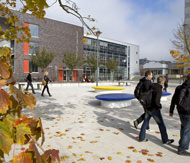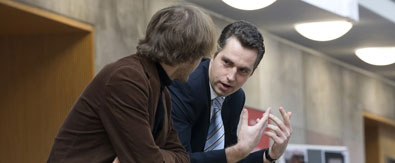Disciplines, methods, subject-specific ways of working and other key skills
Teaching and research are not only inextricably connected as teaching reflects the latest developments in research. Specialist methods, ways of working and practices are not only taught but are also a medium for teaching. University teaching at Viadrina aims to introduce students to the (different) strategies, approaches and forms of work used in the social sciences, law, economics and the arts and to enable students to practise applying them, thus permitting theory-informed reflection in a community of inquiring teachers and students.
University teaching has to balance its relevance to research and relevance to students’ chosen careers, teaching and examinations, the interests of students and teachers, social and professional requirements. University education is organized in the form of degree programmes and other programmes aimed at specific university qualifications and certificates in which the teaching of theoretical and practical knowledge, methods and working techniques, as well as the development of personal and social skills, is weighted and organized as relevant. From the very beginning, theory-informed reflection on subject-related, academic and social issues is central to university-level teaching and learning.
Subject-specific teaching starts by drawing on students’ existing social skills and the personal ability to comprehend and to communicate insights and processes - although the development of such skills and abilities is not dependent on a particular subject. These include the knowledge, skills and attitudes that are important for successful learning and research, for personal development, adapting to professional challenges and playing an active part in society, with a critical eye and with a view to sustainable development and participation in decision-making processes. Examples of such key skills are basic oral, written and digital communication and presentation skills, including an awareness of the need to respect data privacy, intercultural, mediation and communication skills and a general level of competence in foreign languages.
A particularly important part of students’ academic development is becoming familiar with academic methods and ways of working. These should be taught as relevant to a specific discipline, their relative importance depending on the subject and degree programme concerned. Some examples are the ability to read and write specialist texts, an understanding of specialist terminology in national and foreign languages, empirical data collection and evaluation, specialist research, being able to process and critically evaluate sources, information and data (including digital research and a knowledge of databases), written and oral presentations making use of digital tools and a knowledge of the communication conventions used in a particular field or profession. In the context of individual disciplines and subjects, students are also taught the skills that will enable them to shape social transformation processes of relevance to sustainability and to reflect on these. In particular, they learn how to expand their knowledge by considering various perspectives and developing strategies for action that take account of conflicting objectives.
Student groups are heterogeneous and students may have learnt a variety of different methods and ways of working. This presents particular challenges for teaching the methods and techniques needed at university, especially in the initial phases of degree programmes. Ultimately, lecturers need to consolidate the methodological and social skills needed for academic study and enable students to become accustomed to the type of learning required at university more quickly. Viadrina therefore supports individual learning processes and promotes students’ self-learning skills and collaborative working skills, making use of the opportunities offered by digitization to further the development of individualized learning processes in heterogeneous groups of students.



